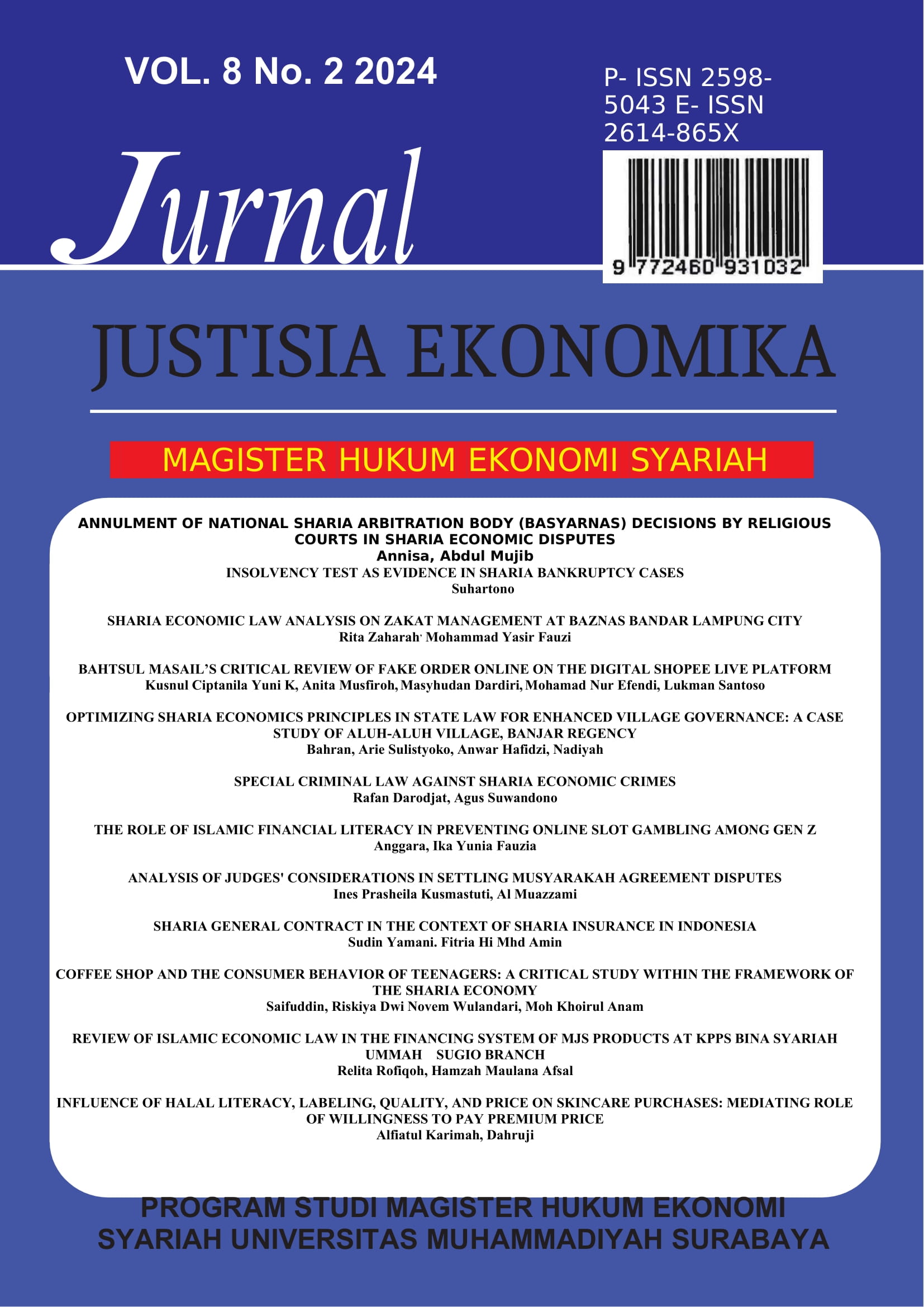ANALYSIS OF JUDGES' CONSIDERATIONS IN SETTLING MUSYARAKAH AGREEMENT DISPUTES
DOI:
https://doi.org/10.30651/justeko.v8i2.23580Keywords:
Fatwa, Musyarakah, Dispute Resolution, Judges' ConsiderationAbstract
Judges in deciding cases of sharia economic dispute resolution must consider sharia principles such as the DSN Fatwa. In fact, there are still decisions that do not consider sharia principles even though the case handled is a musyarakah contract financing dispute. This research method is normative to examine the judge's consideration in resolving musyarakah contract financing disputes. The secondary data of this research was obtained through literature study and analyzed descriptively qualitatively. The results of this study are that the legal rules used by judges are incomplete. Judges who should apply sharia principles do not use DSN Fatwas such as DSN Fatwa No. 08/DSN-MUI/ IV/2000 concerning Musyarakah Financing and DSN Fatwa No. 42/DSN-MUI/VIII/2004 concerning Ta'widh as a consideration. The nominal ta'widh charged to the defendant was also deemed inappropriate due to the absence of evidence of real losses suffered by the plaintiff. The findings of this research are expected to be a consideration, especially for judges in the Religious Courts who handle sharia economic disputes. Judges are expected to explore the legal aspects and sharia principles completely so that the resulting decisions reflect justice, certainty, and expediency while still based on sharia principles.
References
Andriani, F. (2014). Implementation of Murabahah and Musyarakah Mutanaqishah Agreements in Home Ownership Financing in Islamic Banking (Case Study at Bank Muamalat Indonesia) Fitria. Journal of Petra Marketing Management, 2(1). https://ejournal.uinsuka.ac.id/syariah/azzarqa/article/view/2078/1554
Anhar, Z. (2022). Implementation of Musyarakah Akad in Islamic Banking. Journal of Islamic Banking and Finance Science, 4(2), 110-122. https://doi.org/10.24239/jipsya.v4i2.145.110-122
Baihaki, A. (2021). Religious Courts' Complete Power to Resolve Sharia Economic Conflicts Following the Constitutional Court's Decision Number 93/PUU-X/2012. Krtha Bhayangkara, 15(2) 289-308. https://doi.org/10.31599/krtha.v15i2.711 Decision No.xx/Pdt.G/2020/PA.Pbg
Dewanto, P. (2020). Reconstruction of judges' consideration of civil dispute decisions based on the value of justice. Journal of Ius Constituendum, 5(2), 303-324. http://dx.doi.org/10.26623/jic.v5i2.2307
Effendi, J. (2018). Reconstruction of the Basis of Judges' Legal Considerations (Based on Legal Values and Sense of Living Conditions in Society). PRENADAMEDIA GROUP. https://books.google.com/books?hl=id&lr=&id=NdeDwAAQBAJ&oi=fnd&pg=PR7&dq=efendi+judge+consideration&ots=66apkADP8F&sig =YcjJ0aK-P4VfFIgjI_AsLOdQemE
Guntara, D., Asyhadi, F., & Prawiyogi, A. G. (2023). Analysis of Judges' Legal Reasoning in
Deciding Sharia Economic Cases on Default in Musyarakah Agreements. Journal of USM
Law Review, 6(2). https://doi.org/10.26623/julr.v6i2.6392
Hasanah, U., & Ichfan, H. (2021). Application of Musyarakah Akad Financing in Islamic Banking. Muhasabatuna: Journal of Islamic Accounting, 3(1), 1. https://doi.org/10.54471/muhasabatuna.v3i1.1085
Kartika, S., & Harahap, M. Y. (2023). The power to make decisions about bankruptcy settlements and the suspension of Islamic banking debt payment obligations. AL-MANHAJ: Journal of Islamic Law and Social Institutions, 5(1), 101-112. https://doi.org/10.37680/almanhaj.v5i1.2195
Najib, Lutfi A. (2024). PROBLEMS OF THE IMPLEMENTATION OF THE COMPETENCY OF THE AGENCY IN THE field of SYARIAH ECONOMY Lutfi Ainun Najib Postgraduate UIN Kiai Haji Achmad Siddiq Jember, East Java, Indonesia Sri Lumatus Sa'adah Postgraduate UIN Kiai Haji Achmad Siddiq Jember, East Java, Indon. 18(3), 1807-1819.
Pertaminawati, H. (2019). Forms of Sharia Economic Disputes and Their Resolution. Dirasat: Journal of Islamic & Civilization Studies, 14(02), 59-83. https://dirasat.id/JSIP/article/view/84
Pusat Pengembangan Publikasi Ilmiah ( P3I) Universitas Muhammadiyah. (2021), Pengembangan Hukum Ekonomi Syariah Melalui Profesionalisme Pendidikan Dan Spiritual Quotient. Edited by Warsidi. UMSurabaya Publishing)
Rasyid, A., & Putri, T. A. (2019). The Dispute Settlement Authority An Examination of Decision Number 93/PUU-X/2012 of the Constitutional Court. Judicial Journal, 12(2).
Rosidah, Z. N., & Karjoko, L. (2021). Philosophical Orientation of Religious Court Judges in Resolving Sharia Economic Disputes. Ius Quia Iustum Law Journal, 28(1), 163-182. https://doi.org/10.20885/iustum.vol28.iss1.art8
Santoso, M. A. (2016). Competence of Religious Court Judges in Resolving Sharia Economic Disputes. http://repository.radenintan.ac.id/416/
Saripudin, U. (2021). Shirkah and its Application in Islamic Financial Institutions. Eqien, 4(1), 63- 79
Setiawati, N. U., & Usanti, T. P. (2018). Breach of Promise Criteria in Musyarakah Financing in Islamic Banks. Lex Journal: Law & Justice Studies, 2(2). https://doi.org/10.25139/lex.v2i2.1410
Taufiqurrohim, A. A., & Al Munawar, F. A. (2022). Ijtihad Method and Legal Considerations of Judges of the Blitar Religious Court in the Hajj Talangan Fund Case of Sharia Economic Disputes Decision Number 3333/Pdt. G/2014/PA. BL. Journal of Islamic Business Law, 6(2).
Warsidi. Strategi Pemasaran Produk Bank Syariah. Yogyakarta: Zahir Publishing, 2023.
Widyarini. Syamsul Hadi. (2016). MUI Fatwa, PSAK, and Musyarakah Practice. Istinbáth, 15(1).
Downloads
Published
How to Cite
Issue
Section
License
HAK CIPTA
Penulis yang mengirimkan artikel dalam jurnal Justisia Ekonomika harus memahami dan menyetujui persyaratan tentang hak cipta jurnal Justisia Ekonomika sebagai berikut:
1. Hak Cipta tulisan / artikel yang diterbitkan di jurnal Justisia Ekonomika otomatis menjadi hak pengelola jurnal atau publisher
2. Meskipun Hak Cipta atas tulisan yang telah diterbitkan di jurnal Justisia Ekonomika adalah menjadi haknya publisher, tetapi penulis masih mempunyai hak untuk : a). Penulis boleh meng-upload di repository kampus, b). Penulis boleh meng-upload di webnya sendiri, c). Penulis boleh meng-upload di google schoolar, orchid dan sinta
LISENSI
Lisensi atas tulisan / artikel yang diterbitkan di jurnal Justisia Ekonomika adalah menggunakan Creative Commons dengan atribusi CC-BY-NC 4.0






















